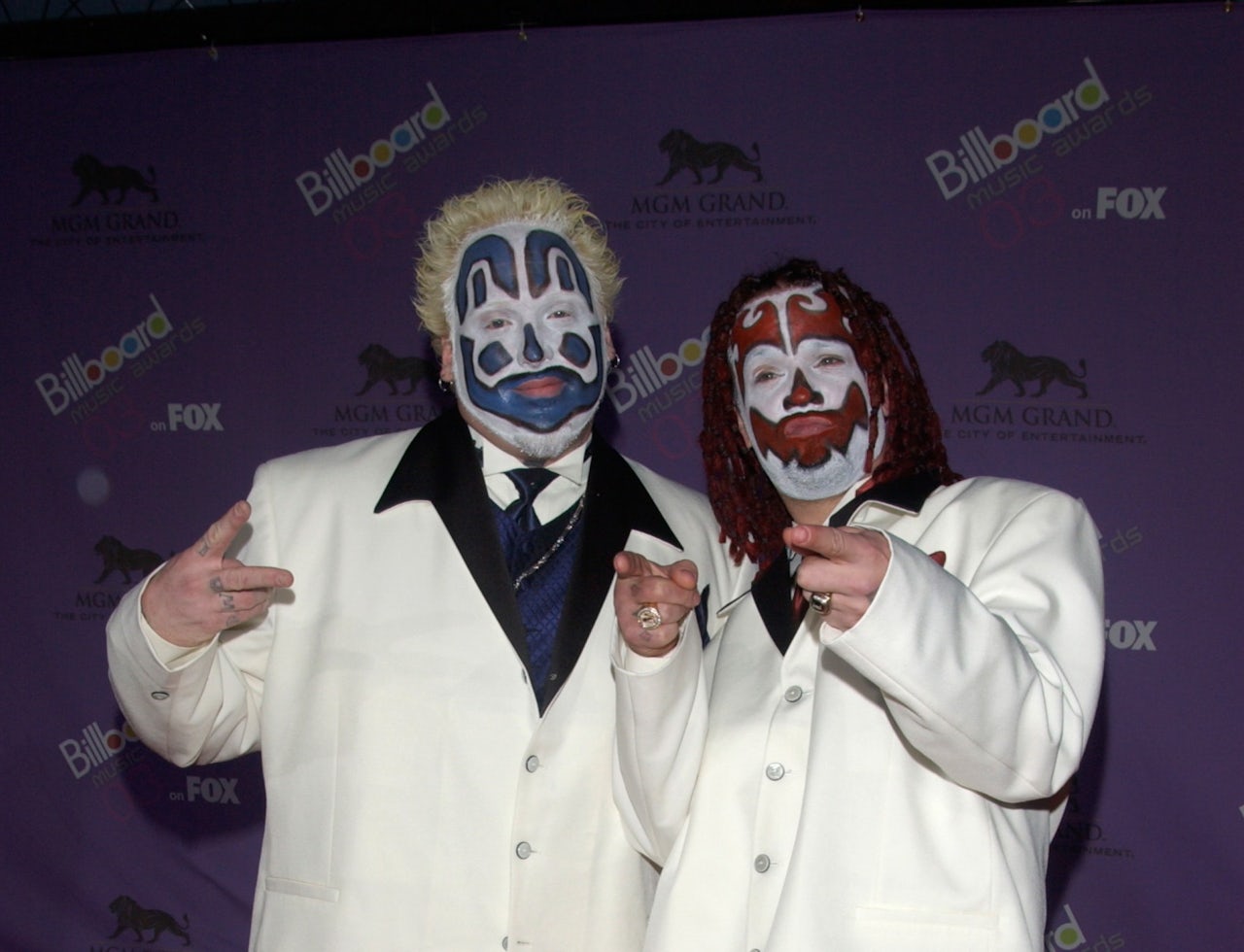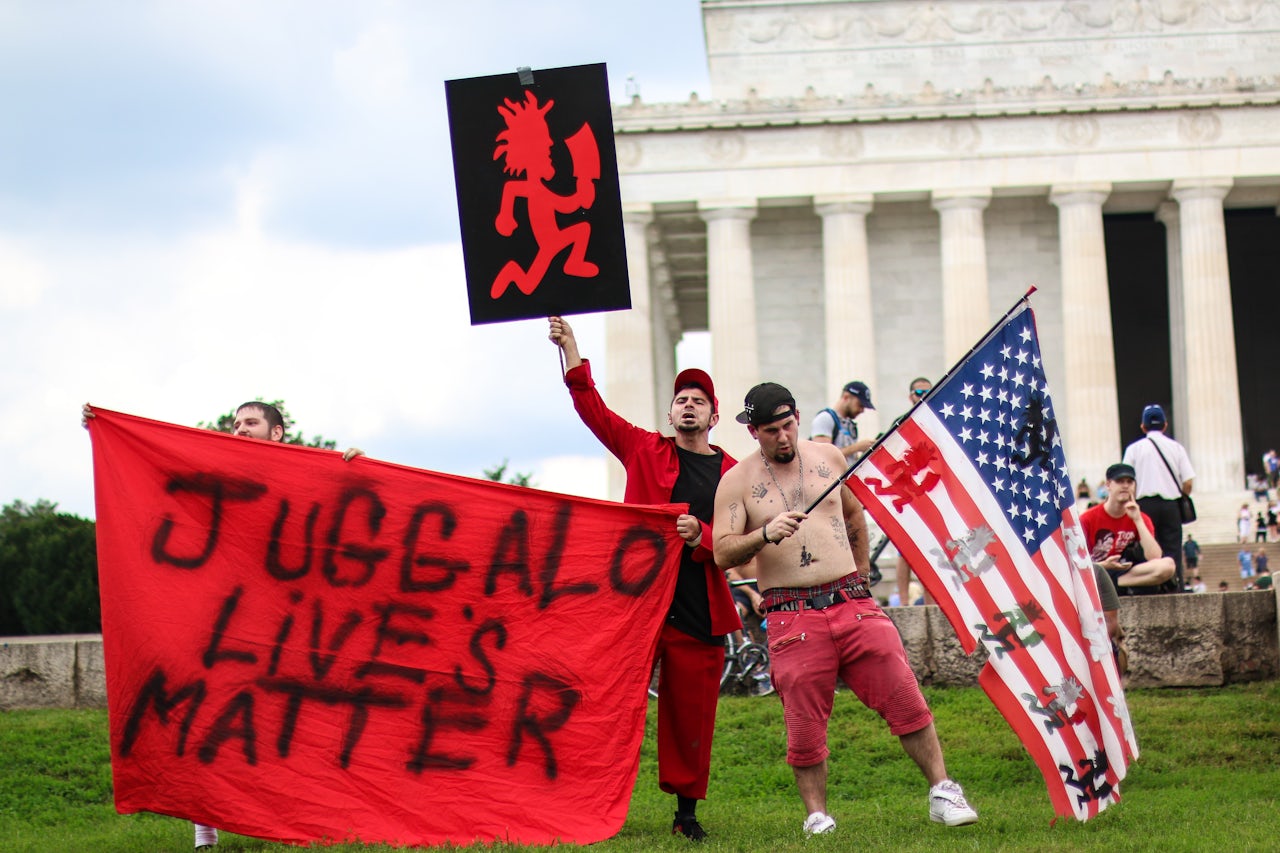As someone approaching their 30th birthday, it feels as though I grew up in a world in which Insane Clown Posse’s existence has always been as immutable as gravity. Unlike the major pop culture staples from my pre-middle school days — Pokémon, Britney Spears, Marilyn Manson, Harry Potter, South Park, and The Matrix, roughly — I cannot recall “discovering” that Insane Clown Posse existed. Instead, they simply were, not unlike trees or God. In middle school, some kid showed up to homeroom on Halloween wearing black-and-white clown facepaint, and I immediately identified him as one of their Juggalo fans. I do not know how I knew this, but I know that I did. I knew they were a thing in high school, I knew they were a thing in college, even as I did not listen to a single song of theirs until 2009, when their music escaped the confines of the Juggalo internet with the unintentionally viral “Miracles.” Fucking cultural memories, how do they work?
I suspect that a lot of people reading this have had a fairly similar relationship with Insane Clown Posse, operating with a vague understanding that they are a famous rap group with a large fanbase that, for various class- and taste-related reasons, you’re supposed to hate. Attracting such ingrained dislike is part of ICP’s genius — they intuitively understand that if you piss off the so-called classy people, the un-classy will feel a stronger affinity with you, especially if you create a larger culture around yourself based on being intentionally gross, unintentionally marginalized, and habitually treaded-upon. For a group whose initial mythology was “we’re evil clowns who kill people in physically impossible ways,” Juggalo culture is refreshingly inclusive: All Juggalos are accepted into the community no matter their background or marginalized status. From the outside, Planet Juggalo can seem like an incredibly gross subculture, but if you step on in, you find that it’s surprisingly welcoming. Time and time again, reporters have ventured to their annual Gathering of the Juggalos festival and walked away surprised and charmed by the goofily trashy, perhaps even cuddly Juggalo community. The goodwill had built up to the point that by the time the FBI unfairly labeled the Juggalos as a gang, the public reaction was sympathy, perhaps even outrage.
It’s this call for empathy that’s won ICP and the Juggalo community an endorsement from the leftist-anarchist labor group Industrial Workers of the World, as well as encouraged anti-fascist demonstrators to team up with Juggalos to march against a pro-Trump rally in Washington, DC. While ICP’s lyrics don’t always align with these political aims — they are a horror-rap group who operated in the ‘90s, and that’s all I’m going to say about that — it is genuinely significant that they have created a culture that has taken a turn towards social justice. And if nothing else, ICP are legends for making this t-shirt — which features a demonic clown burning the Confederate flag on one side and, in case the message weren’t clear enough, the words “FUCK YOUR REBEL FLAG” on the other — and they should be respected as such.
So that’s one thing going on with Insane Clown Posse. Here I must note another important detail, and perhaps the only one that matters to many people: Insane Clown Posse’s music is not “good,” in the conventional sense of the word. The beats are often full of grating guitar and/or circus sounds, and MC’s Violent J and Shaggy 2 Dope have rapped in the same unwavering, sing-song cadence for 25 years despite several total stylistic overhauls in the greater hip-hop landscape. Their lyrics, moreover, are often simultaneously childish and horrifying (My axe is my buddy, and when I wind him back / Me and my axe will give your forehead a buttcrack, “My Axe”; Don’t bother trying to analyze these rhymes / In this song I say “fuck” 93 times, ““Fuck the World” ).”)
But potheads understand that taste is relative, and ICP’s aesthetic merits certainly place secondary to the truth of their alluringly authentic power of community. They run their own record label, produce the vast majority of their music in-house, and more importantly, have the weirdest and craziest music festival in existence. Additionally, and I say this without a whiff of irony, their live show is completely fantastic. I have been to two Insane Clown Posse concerts, and both times I’ve felt refreshingly out of my comfort zone as I witnessed a room full of sweaty people in clown makeup scream with joy while getting blasted with cheap soda. I strongly recommend seeing them live.
This penchant for spectacle, combined with their rabid fanbase, allowed Insane Clown Posse to benefit from the changing structure of the music media (as well as pretty much every other type of media), which in the late 2000s increasingly began covering unmined artists in order to get them clicks from previously denigrated artists with massive audiences. As someone who worked in music journalism during the tail end of this period, there was an incentive to write about artists who had massive followings on social media in a way that conferred a sense of legitimacy on them, in the hopes that they would share your article about them on Facebook. Insane Clown Posse, backed by an army of Juggalos ready to read anything that didn’t actively say they sucked, were internet gold.
This confluence of shifts in politics, taste, and media has put ICP in the strange position of achieving a begrudging legitimacy in the eyes of people who once wrote them off. The only problem, again, is that their music ain’t that great. For years, ICP essentially farmed out the task of “making good albums” to their understudies in Twiztid, who were kind of like Eminem if he were two dudes and really into horror movies (this was taken to the logical extreme in 2000 when, in response to a diss from Eminem, ICP responded with a track where Twiztid actually did all the rapping ). Nowadays, Twiztid is on their own and their duties have been passed on to a rapper named Ouija Macc, a vegan rapper from Vegas who recently collaborated with Pictureplane and is into social justice and beating up Nazis. (Full disclosure, Ouija is also a friend of mine.) Still, with everything swinging their way these days, ICP had something of an obligation to try to make a halfway decent record in an attempt to capitalize on all the goodwill.
The result, Fearless Fred Fury, their first album since 2015, succeeds not as a great record on its own, but as the purest distillation of everything that is appealing about Insane Clown Posse. As with any ICP album worth its weight in Faygo, it features songs about being a psychopathic murderer (“Triplex” ), necrophilia (“Hot Head” ), and killing people who disrespect Juggalos (“Seriously Hilarious” ), which I would classify as works of “fan service.” However, the record also features “Satellite,” a song about appreciating what you have, “Nobody’s Fault,” a genuinely touching and raw reflection on depression, as well as “Game Over,” a warning that playing too many video games will stunt you socially. It’s not that the latter songs are necessarily better than the former. On one hand, “Satellite” and “Nobody’s Fault” are enjoyable enough that I’d play them for someone who, unlike me, is not an ultra-contrarian rap nerd. (“Game Over,” with its cacophony of beeps and bloops, is basically unlistenable.) On the other, the roundly antisocial “West Vernor Ave” and “Seriously Hilarious” are overwhelmingly satisfying rap songs even when you’re not grading on a curve. The point is there’s a difference between being in bad taste and actually having it, and on Fearless Fred Fury, ICP for the most part stays on the correct side of that particular chasm, which I assume is full of fake blood and guts and also probably jizz.
But, this is an Insane Clown Posse album. You do not listen to it because you are expecting musical complexity or lyrical profundity, and in a world in which unspeakable horrors pepper the news far too frequently, even when the record makes a good-faith effort to shock the listener it mostly comes across as harmless schlock. If there is an argument to be made for listening to Fearless Fred Fury, it is that it exists. If you are an insane Insane Clown Posse fan, you’ll be enraptured even if this record were an album-length cover of Lou Reed’s Metal Machine Music, for these dad-aged dudes from Detroit have given you so much. If you’re not, there’s so much baggage around ICP as an entity that it’s impossible to listen to their music objectively. The best I can tell you is that the world of Insane Clown Posse is a vast one, featuring pro wrestling promotion, off-Broadway plays, and a Dominion-style deckbuilding game. There’s a lot to explore, potentially even to like, and if you’re at all inclined to dip your toe into the waters, you might as well start by listening to their new album. At bare minimum, it’ll help you understand why other people like them, and that’s all they’re are asking for, really.

